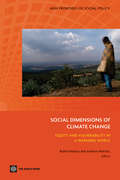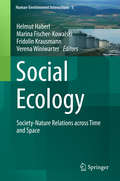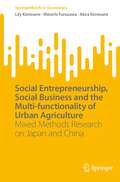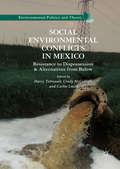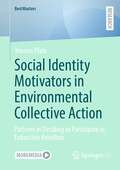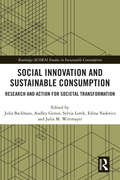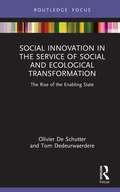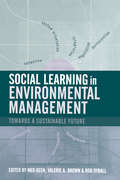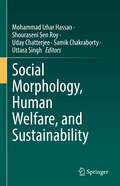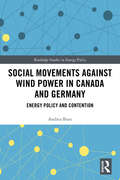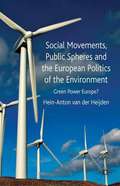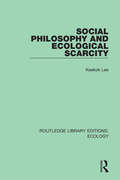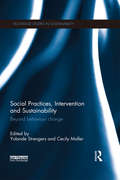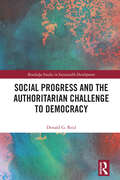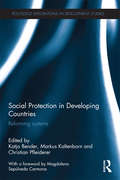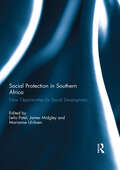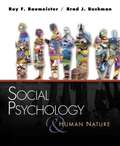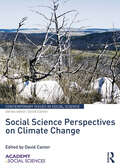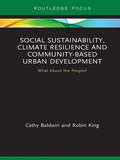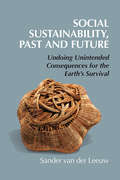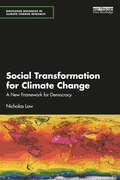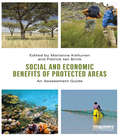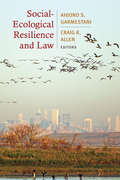- Table View
- List View
Social Dimensions of Climate Change: Equity and Vulnerability in a Warming World
by Andrew Norton Robin MearnsClimate change is arguably the most profound challenge facing the international community in the 21st century. It is as much a challenge for poverty reduction, growth and development as it is a global environmental issue. It could undermine or reverse progress in reducing poverty and attaining the Millennium Development Goals, thereby unraveling many of the development gains of recent decades. It already threatens the livelihoods, health and well-being of millions of people worldwide, and of the poorest and most vulnerable groups in particular. And it has potentially far-reaching implications for international relations and for personal, national and regional security. While significant uncertainties still remain, tremendous strides have been made over recent years in improving scientific understanding of the human processes driving global climate change and the likely impacts on world ecosystems. What is much less well understood is how these dynamics in the physical environment will interact with those of socio-economic systems, what the consequences will be for society, and how best to address them. In order to focus attention on these previously neglected and poorly understood social dimensions of climate change, the World Bank convened an international workshop in March, 2008, with the participation of community activists, former heads of state, leaders of Indigenous Peoples, representatives of non-governmental organizations, international researchers, and staff of the World Bank and other international development agencies. This edited volume brings together revised versions of many of the papers presented during that workshop, as an initial step in taking stock of existing knowledge on the social dimensions of climate change. Several new papers were also commissioned for this volume.
Social Ecology
by Marina Fischer-Kowalski Helmut Haberl Fridolin Krausmann Verena WiniwarterThis book presents the current state of the art in Social Ecology as practiced by the Vienna School of Social Ecology, globally one of the main research groups in this field. As a significant contribution to the growing literature on interdisciplinary sustainability studies, the book introduces the purpose and nature of Social Ecology and then places the "Vienna School" within the broader context of socio-ecological and other interdisciplinary environmental approaches. The conceptual and methodological foundations of Social Ecology are discussed in detail, allowing the reader to obtain a broad overview of current socio-ecological thinking. Issues covered include socio-metabolic transitions, socio-ecological approaches to land use, the relation between actor-centered and system approaches, a socio-ecological theory of labor and the importance of legacies, as conceived in Environmental History and in Long-Term Socio-Ecological Research. To underpin this overview empirically, the strengths of socio-ecological research are elucidated in cases of cutting-edge research, introducing a variety of themes the Vienna School has been tackling empirically over the past years. Given how the field is presented - reflecting research carried out on different scales, reaching from local to global as well as from past to present and future - and due to the way the book is structured, it is suitable for classroom use, as a primer, and also as an overview of how Social Ecology evolved, right up to its current research frontiers.
Social Entrepreneurship, Social Business and the Multi-functionality of Urban Agriculture: Mixed Methods Research on Japan and China (SpringerBriefs in Economics)
by Lily Kiminami Akira Kiminami Shinichi FuruzawaThis is the first book to clarify the relationships between multi-functions of urban agriculture, creative classes, and social business in China and Japan. Specifically, it constructs a new framework showing how these factors contribute to the sustainability of cities by introducing the mixed methods research of structural equation modeling and the trajectory equifinality model. Policy implications drawn from the research suggests that governments should provide opportunities to create a virtuous cycle to improve the accumulation of social capital in order to attract those who think creatively. It is widely agreed that a sustainable city should meet the needs of the present generation without sacrificing the ability of future generations to meet their own needs. However, there has been no completely agreed-upon definition for what a sustainable city should be nor upon the paradigm for what components should be included. On the other hand, there is a possibility that the multi-functions of urban agriculture may attract especially those who are thinking creatively. These creative thinkers have a high level of social capital, pay attention to social issues, and are greatly motivated to find solutions through social enterprises such as agriculture-related business.
Social Environmental Conflicts in Mexico: Resistance To Dispossession And Alternatives From Below (Environmental Politics And Theory Ser.)
by Darcy Tetreault Cindy McCulligh Carlos LucioWhat are the political economic conditions that have given rise to increasing numbers of social environmental conflicts in Mexico? Why do these conflicts arise in some local and regional contexts and not in others? How are social environmental movements constructed and sustained? And what are the alternatives? These are the questions that this book seeks to address. It is organized into three parts. The first provides a panoramic view of social environmental conflicts in Mexico and of alternatives that are being constructed from below in rural areas. It also provides an analysis of the recent reforms to open the country’s energy sector to private and foreign investment. The second is comprised of local-level case studies of conflict (and no conflict) in diverse geographic locations and cultural settings, particularly in relation to the construction of wind farms, hydraulic infrastructure, industrial water pollution, and groundwater overdraft. The third explores alternatives from below in the form of community-based ecotourism and traditional mezcal production. A concluding chapter engages comparative and global analysis.
Social Identity Motivators in Environmental Collective Action: Patterns in Deciding to Participate in Extinction Rebellion (BestMasters)
by Yvonne PlateSocial Identity research has found prominence in the realm of collective action but lacks an environmental activism focus. This study gathers individuals’ experiences to explore the influences on decision-making processes to join an environmental activist group – the local Extinction Rebellion (XR) group in Stuttgart, Germany. This case study is used to identify patterns in this process, to test the applicability of existing models and to explore the significance of social identity. Activists and past activists were interviewed. The results make it apparent that the existing models are not sufficient to represent social identity processes in environmental activism. The findings are visualized in a suggested adjusted model of collective action, which suggests norms and morals and (politicized) social identity as a twin core influencing collective action. Social identity retains its significance at the center of the model. Furthermore, it is suggested that collective efficacy beliefs and a sense of agency are interchangeable factors influencing the twin core and collective action directly. Injustice perceptions remain essential. Social connections, group identification, group dynamics, participatory efficacy, self-identity, and image are found to play a role occasionally but require further investigation. The convergence of collective efficacy beliefs and a sense of agency and the valuation of factors present especially relevant future research topics.
Social Innovation and Sustainable Consumption: Research and Action for Societal Transformation (Routledge-SCORAI Studies in Sustainable Consumption)
by Audley Genus Sylvia Lorek Julia Backhaus Edina Vadovics Julia M WittmayerThis book showcases strategic policies for and processes of societal transformation, which are required to address the challenge of sustainability. Based on the latest thinking at the interface of social innovation, sustainable consumption and the transformation of society, the book provides: in-depth discussions at the nexus of sustainable consumption, social innovation and social transformation, highlighting their significance to sustainability-related policy and practice; detailed case studies of social innovation in energy, food, housing and policy which illustrate emerging practice and promising policy, business and civil society interventions; and critical reflections and commentaries on the contribution of social innovation to societal transformation. Bringing together aspiring scholars and leading thinkers on this topic, this book leads to compelling new insights for an international audience into the potential of social innovation for sustainable consumption and the transformation of society. It will be of great interest to students and scholars of sustainable consumption, sustainable development, (social) innovation studies and environmental sociology.
Social Innovation in the Service of Social and Ecological Transformation: The Rise of the Enabling State (Routledge Focus on Environment and Sustainability)
by Tom Dedeurwaerdere Olivier De SchutterThis book explores how the State can play a role as an enabler of citizens-led social innovations, to accelerate the shift to sustainable and socially just lifestyles. To meet the twin challenges of environmental degradation and the rise of inequalities, societal transformation is urgent. Most theories of social change focus either on the role of the State, on the magic of the market, or on the power of technological innovation. This book explores instead how local communities, given the freedom to experiment, can design solutions that can have a transformative impact. Change cannot rely only on central ordering by government, nor on corporations suddenly acting as responsible citizens. Societal transformation, at the speed and scope required, also should be based on the reconstitution of social capital, and on new forms of democracy emerging from collective action at the local level. The State matters of course, for the provision of both public services and of social protection, and to discipline the market, but it should also act as an enabler of citizen-led experimentation, and it should set up an institutional apparatus to ensure that collective learning spreads across jurisdictions. Corporations themselves can ensure that society taps the full potential of citizens-led social innovations: they can put their know-how, their access to finance, and their control of logistical chains in the service of such innovations, rather than focusing on shaping consumers’ tastes or even adapting to consumers’ shifting expectations. With this aim in mind, this book provides empirical evidence of how social innovations, typically developed within "niches", initially at a relatively small scale, can have society-wide impacts. It also examines the nature of the activism deployed by social innovators, and the emergence of a "do-it-yourself" form of democracy. This book will appeal to all those interested in driving societal change and social innovation to ensure a sustainable and socially just future for all.
Social Learning in Environmental Management: Towards a Sustainable Future
by Rob Dyball Meg KeenSocial Learning in Environmental Management explores and expands the approaches to collective learning most needed to help individuals, communities, experts and governments work together to achieve greater social and ecological sustainability. It provides practical frameworks and case studies to assist environmental managers in building partnerships that can support learning and action on issues arising from human impacts on the life-support systems of our planet. In this book, social learning frameworks and case studies address the three areas of collaboration, community, government and professional, in some detail. The resulting guidelines and their practical applications provide key source material for undergraduate and postgraduate professional education in the fields of social and environmental sciences, political science, planning, geography and urban studies, and also for professionals in environmental management.
Social Morphology, Human Welfare, and Sustainability
by Shouraseni Sen Roy Mohammad Izhar Hassan Uday Chatterjee Samik Chakraborty Uttara SinghThis volume discusses a broad range of human welfare problems associated with and stemming from social issues, natural resource deficiencies, environmental hazards, vulnerability to climate change, and sustainability challenges. The chapters form a framework centered around the concept of social morphology, i.e. the role of humans in shaping society, and associated human-nature interactions which inform the ability to achieve sustainable welfare and well-being. The book is divided in six sections. Section I contains the introductory chapters where the book explores shifting interfaces between environment, society, and sustainability outcomes. Section II discusses contemporary issues of social welfare, and covers sustainable approaches in geo-heritage and ecotourism. Section III addresses the roots of various social conflicts and inequalities in relation to overpopulation, poverty, illiteracy, employment concerns, and human migration. Section IV highlights social security and areas of social deprivation, including urban affordability, gender equality, and women’s health. Section V covers social issues resulting from natural hazards and disasters. Section VI concludes the book with a discussion of the way forward for social sustainability. The book will be of interest to students, researchers, policy makers, environmentalists, NGOs, and social scientists.
Social Movements against Wind Power in Canada and Germany: Energy Policy and Contention (Routledge Studies in Energy Policy)
by Andrea BuesTaking a comparative case study approach between Canada and Germany, this book investigates the contrasting response of governments to anti-wind movements. Environmental social movements have been critical players for encouraging the shift towards increased use of renewable energy. However, social movements mobilizing against the installation of wind turbines have now become a major obstacle to their increased deployment. Andrea Bues draws on a cross-Atlantic comparative analysis to investigate the different contexts of contentious energy policy. Focusing on two sub-national forerunner regions in installed wind power capacity – Brandenburg and Ontario – Bues draws on social movement theory to explore the concept of discursive energy space and propose explanations as to why governments respond differently to social movements. Overall, Social Movements against Wind Power in Canada and Germany offers a novel conceptualization of discursive-institutional contexts of contentious energy politics and helps better understand protest against renewable energy policy. This book will be of great interest to students and scholars of renewable energy policy, sustainability and climate change politics, social movement studies and environmental sociology.
Social Movements, Public Spheres and the European Politics of the Environment
by Hein-Anton van der HeijdenThis book analyzes how the European environmental movement has influenced the problem definitions and solution strategies of European policy issues, examining biodiversity, GMOs, Trans-European Transport Networks, and climate change.
Social Networks and Natural Resource Management: Uncovering the Social Fabric of Environmental Governance
by Örjan Bodin Christina PrellSocial Network Analysis (SNA), a quantitative approach to the study of social relations, has recently emerged as a key tool for understanding the governance of natural resources. Bringing together contributions from a range of researchers in the field, this is the first book to fully explore the potential applications of SNA in the context of natural resource management. Topics covered include the role of SNA in stakeholder selection; improving fisheries management and conservation; the effect of social network ties on public satisfaction and agrarian communication networks. Numerous case studies link SNA concepts to the theories underlying natural resource governance, such as social learning, adaptive co-management and social movements theory. Reflecting on the challenges and opportunities associated with this evolving field, this is an ideal resource for students and researchers involved in many areas of natural resource management, environmental biology, sustainability science and sociology.
Social Philosophy and Ecological Scarcity (Routledge Library Editions: Ecology #8)
by Keekok LeeOriginally published in 1989 Social Philosophy and Ecological Scarcity presents a systematic study of the implications of ecological scarcity for social philosophy. The book argues for a new social philosophy based on a conception of the ‘good society’ and the ‘good life’ which makes fewer, rather than more demands on scarce ecological resources. The book shows that the two major competing social philosophies in modern philosophical thought – the bourgeois liberal and the state socialist – are both forms of capitalism. Despite their obvious differences, they both pursue the logic of capitalism, of ever-increasing accumulation, growth and consumption. This pursuit is carried out by means of modern science and its technology, which assume that Nature’s resources are inexhaustible and can be exploited to meet infinite human wants or needs, ignoring ecological scarcity. The recognition of ecological scarcity would lead to a social philosophy, based on a frugal mode of socialism which has more affinities with the social visions of Fourier and Morris than with that of Marx. Their theories, far from being too ‘utopian’, are shown as more ‘realistic’ and less ‘fantastic’ than either bourgeois capitalism or state capitalism based on the Marxist model.
Social Practices, Intervention and Sustainability: Beyond behaviour change (Routledge Studies in Sustainability)
by Yolande Strengers Cecily MallerIn an era of dramatic environmental change, social change is desperately needed to curb burgeoning consumption. Many calls to action have focused on individual behaviour or technological innovation, with relative silence from the social sciences on other modes and methods of intervening in social life. This book shows how we can go beyond behaviour change in the pursuit of sustainability. Inspired by the ‘practice turn’ in consumption studies, this interdisciplinary book looks through the lens of social practice theory to explore important and timely questions about how to intervene in social life. It discusses a range of applied sustainability topics including energy consumption, housing provision, water demand, transport, climate change, curbside recycling and smart grids, seeking to redefine what intervention is, how it happens, and who or what can intervene to address the growing list of environmental calamities facing contemporary societies. These issues are explored through a range of specific case studies from Australia, the UK and the US, providing theoretical insights that are of international relevance. The book will be of interest to researchers and students in the fields of sociology, consumption studies, environmental studies, geography, and science and technology studies, as well as policy makers and practitioners seeking to intervene in social life for sustainability.
Social Progress and the Authoritarian Challenge to Democracy (Routledge Studies in Sustainable Development)
by Donald G. ReidSocial Progress and the Authoritarian Challenge to Democracy examines the authoritarian challenge to present-day democracy through a framing of social progress theory and the idea of the social contract. Building on the author’s previous work, this book discusses whether social progress is linear and on a continual upward trajectory to human betterment, or if there are peaks and troughs along the way. More importantly, it questions that, if social progress exists, is it compatible with social and environmental sustainability? At the outset the book introduces the concepts of social contract theory and the idea of human social progress, long considered to be settled conditions, now ripe for further examination. Each chapter carefully analyses the contemporary struggle between democracy and authoritarianism, using examples from the USA as a foundation to discuss and compare democracies from around the world encountering the pressures of rising authoritarianism, including anti-immigration, xenophobia and anti-institutionalism. It argues that if the climate crisis is to be urgently addressed as required, the rise in authoritarian thinking, with its focus on maintaining power and the creation of individual wealth, presents a challenge to both our societal foundations and environmental sustainability. Highlighting and analysing topics of critical importance to today’s society, this book will have widespread appeal to academics, researchers and postgraduate students throughout the social sciences including sociology, political science, philosophy, environmental sustainability and development studies.
Social Protection in Developing Countries: Reforming Systems (Routledge Explorations in Development Studies)
by Markus Kaltenborn Katja Bender Christian PfleidererProviding universal access to social protection and health systems for all members of society, including the poor and vulnerable, is increasingly considered crucial to international development debates. This is the first book to explore from an interdisciplinary and global perspective the reforms of social protection systems introduced in recent years by many governments of low and middle-income countries. Although a growing body of literature has been concerned with the design and impact of social protection, less attention has been directed towards analyzing and explaining these reform processes themselves. Through case studies of African, Asian, and Latin American countries, this book examines the ‘global phenomenon’ of recent social protection reforms in low and middle-income areas, and how it differs across countries both in terms of scope and speed of institutional change. Exploring the major domestic and international factors affecting the political feasibility of social protection reform, the book outlines the successes and failures of recent reform initiatives. This invaluable book combines contributions from both academics and practitioner experts to give students, researchers and practitioners in the fields of social security, economics, law and political science an in-depth understanding of political reform processes in developing countries.
Social Protection in Southern Africa: New Opportunities for Social Development
by Leila Patel, James Midgley and Marianne UlriksenA new generation of innovative social protection strategies is emerging in southern Africa. Although cash transfers are most prevalent, some country strategies include combinations of interventions such as food, livelihood inputs and support, asset building, public works and social services. The strategies vary in their commitment to social rights, their institutional and funding arrangements, the reach, scope and design of the programmes, and the behavioural conditions attached to grant access. The proliferation of national social protection in the Global South has been widely supported by governments, international agencies and non-governmental organisations (NGOs).This book offers researchers and policymakers much to think about when considering the rapid growth of social protection in southern Africa, the challenges this presents and the opportunities it offers for social development and economic growth. Hence, the book is a contribution to scholarship and policy debate on how to solve intractable social development problems in Africa and elsewhere.This book was originally published as a special issue of Development Southern Africa.
Social Psychology and Human Nature
by Roy F. Baumeister Brad J. BushmanThe material discussed in this book is intensely relevant to your life. For example, how many of you have asked yourself something along these lines: How can I get him to go along with my plan? Should I ask her right up front to do this big favor, or is there a better way to get her to say yes? How can I bring them around to my way of thinking? Chances are, something in this book will prove helpful to you in the future. This is not to say that social psychology is a cookbook for how to manipulate people. But social psychology can help you understand basic principles of social influence, as well as many other principles of social behavior.
Social Science Perspectives on Climate Change (Contemporary Issues in Social Science)
by David CanterAlthough it is generally accepted that the climate is changing for the worse and that human activities are a major contributing factor in that change, there is still only marginal response to the challenge posed by climate change. The reasons behind this limited response are becoming clearer through the recognition that climate change is not just a set of physical science facts, but it is also part of a series of complex social processes. Consequently, this book is important in providing social science perspectives on a range of attempts to adjust human activity to reduce its environmental impact. These attempts vary from the changing of the dress code in Japanese offices to the creation of zero-carbon, gated communities in Bangalore, India. Taken together, the contributions to this book provide timely insights into the complexities of saving the planet through human endeavour. This book was originally published as a special issue of Contemporary Social Science.
Social Sustainability, Climate Resilience and Community-Based Urban Development: What About the People? (Routledge Focus on Environment and Sustainability)
by Cathy Baldwin Robin KingUrban communities around the world face increased stress from natural disasters linked to climate change, and other urban pressures. They need to grow rapidly stronger in order to cope, adapt and flourish. Strong social networks and social cohesion can be more important for a community’s resilience than the actual physical structures of a city. But how can urban planning and design support these critical collective social strengths? This book offers blue sky thinking from the applied social and behavioural sciences, and urban planning. It looks at case studies from 14 countries around the world – including India, the USA, South Africa, Indonesia, the UK and New Zealand – focusing on initiatives for housing, public space and transport stops, and also natural disasters such as flooding and earthquakes. Building on these insights, the authors propose a 'gold standard': a socially aware planning process and policy recommendation for those drawing up city sustainability and climate change resilience strategies, and urban developers looking to build climate-proof infrastructure and spaces. This book will be of great interest to students and scholars of urban studies, resilience studies and climate change policy, as well as policymakers and practitioners working in related fields.
Social Sustainability, Past and Future: Undoing Unintended Consequences for the Earth's Survival (New Directions in Sustainability and Society)
by Sander van der LeeuwIn this book, Sander Van der Leeuw examines how the modern world has been caught in a socio-economic dynamic that has generated the conundrum of sustainability. Combining the methods of social science and complex systems science, he explores how western, developed nations have globalized their world view and how that view has led to the sustainability challenges we are now facing. Its central theme is the co-evolution of cognition, demography, social organization, technology and environmental impact. Beginning with the earliest human societies, Van der Leeuw links the distant past with the present in order to demonstrate how the information and communications technology revolution is undermining many of the institutional pillars on which contemporary societies have been constructed. An original view of social evolution as the history of human information-processing, his book shows how the past offers insight into the present, and can help us deal with the future. This title is also available as Open Access.
Social Transformation for Climate Change: A New Framework for Democracy (Routledge Advances in Climate Change Research)
by Nicholas LowThis book argues that social transformation is both necessary and possible if democracies are to respond effectively to the climate crisis without social collapse. Climate transformation and social transformation are intimately connected. Understanding how to address climate change requires a historical approach both to the climate and to our collective institutions of humanity. Drawing on the works of Karl Polanyi and Thomas Piketty, Nicholas Low traces the course of historic social transformations from Britain, Russia, and Australia to highlight key commonalities: social crisis, the widespread sense by those in power that ‘something has to change’, the shift in ideology, and the political champions that drove the change. Within its international scope, the book delves deeper into specific instances of inequality and poverty from Britain, the USA, Australia, and the Global South. It shows how these examples are connected with the current climate emergency. Finally, the author draws together all the evidence from past transformations to outline how a new social democratic transformation could generate a better future, creating the social solidarity necessary to cope with the climate crisis. This book will be of great interest to students and scholars of climate change, environmental politics and policy, political ecology, environmental sociology, and environmental studies more broadly. Its argument is also highly relevant for political actors working towards social and economic transformation.
Social and Economic Benefits of Protected Areas: An Assessment Guide
by Marianne Kettunen Patrick Ten BrinkProtected areas (PAs) contain biodiversity and ecosystems of high conservation value. In addition, these areas provide a range of benefits, both direct and indirect, to our societies and economies, i.e. so called ecosystem services. These services include, for example, an ecosystem's ability to regulate floods and climate, purify water, secure the pollination of crops, and create opportunities for recreation, culture and tourism. This book offers a comprehensive introduction to the socio-economic benefits of PAs and PA networks and provides step-by-step practical guidance on identifying, assessing and valuing the various ecosystem services and related benefits provided by PAs. It also aims to improve the communication of PA benefits to different stakeholders and the general public. It is shown that identifying and valuing the socio-economic benefits of PAs can be beneficial for several reasons. Demonstrating socio-economic importance of a protected site can significantly increase political and stakeholder support for the site and resolve conflicts between different interest groups. This can lead to positive changes in policies and decision-making. Insights on PA benefits are also needed to identify a combination of actions and land use practices that best support the sustainable and equitable utilisation of these benefits, while retaining a site’s conservation goals. Finally, demonstrating different benefits can help to discover alternative and sustainable sources for financing the management of PAs.
Social-Ecological Resilience and Law
by Craig Allen Ahjond GarmestaniEnvironmental law envisions ecological systems as existing in an equilibrium state, reinforcing a rigid legal framework unable to absorb rapid environmental changes and innovations in sustainability. For the past four decades, "resilience theory," which embraces uncertainty and nonlinear dynamics in complex adaptive systems, has provided a robust, invaluable foundation for sound environmental management. Reforming American law to incorporate this knowledge is the key to sustainability. This volume features top legal and resilience scholars speaking on resilience theory and its legal applications to climate change, biodiversity, national parks, and water law.
